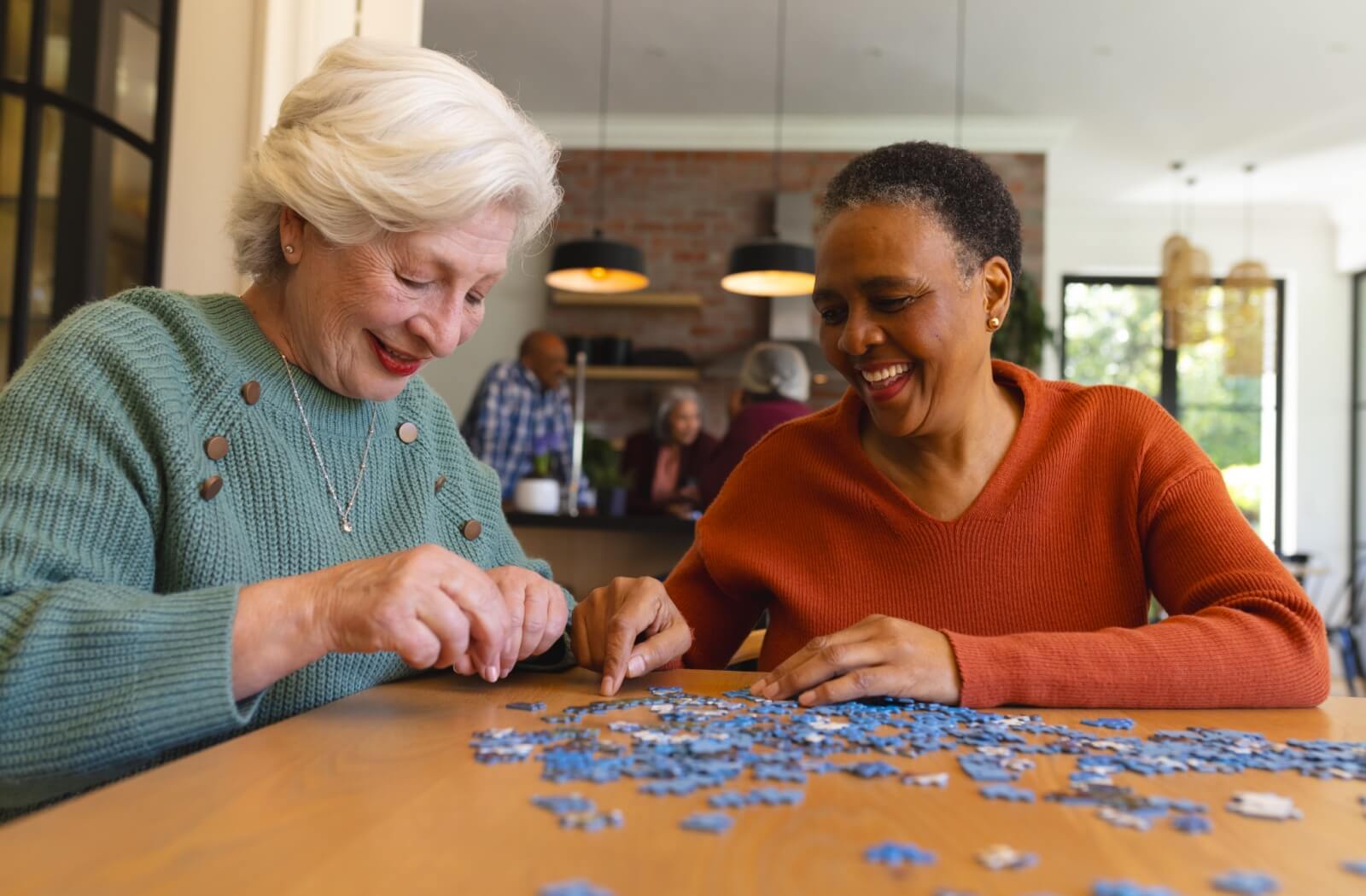Key Takeaways
- Cognitive therapy can help slow the progression of dementia symptoms by stimulating memory and problem-solving skills.
- Activities such as puzzles, art, music, and storytelling provide meaningful mental engagement for seniors.
- Families can feel reassured knowing that cognitive therapies enhance both daily functioning and emotional well-being.
- Supportive communities create structured opportunities for seniors to thrive through personalized cognitive programs.
Cognitive therapy is a form of structured mental stimulation designed to strengthen brain function that is offered in memory care and dementia care settings. While dementia affects memory, reasoning, and communication skills, the brain retains its ability to adapt through neuroplasticity. Cognitive therapies tap into this potential by exercising the mind much like physical therapy strengthens muscles.
In dementia care, cognitive therapy does not cure the condition, but it can help preserve skills, delay cognitive decline, and improve emotional health. These therapies can be personalized, ensuring activities are appropriate for each person’s abilities and interests. By focusing on engagement rather than performance, cognitive therapy provides dignity, purpose, and joy.
How Cognitive Therapy Supports Dementia Care
Living with dementia presents challenges for both seniors and their families. Cognitive therapy helps address these challenges by promoting:
Memory Retention
Simple memory exercises such as recalling past events, identifying familiar faces, or engaging in reminiscence therapy strengthen neural connections. These practices help seniors maintain independence for longer and give families valuable moments of recognition.
Problem-Solving and Focus
Structured tasks like matching games or number puzzles stimulate problem-solving skills. These activities not only sharpen focus but also encourage a sense of accomplishment, which can boost confidence.
Emotional Well-Being
Cognitive therapy provides opportunities for self-expression and interaction. This can reduce feelings of frustration or isolation, common experiences for those living with dementia. Shared activities often spark joy, laughter, and a sense of belonging.
Improved Communication
Speech-based therapies and memory exercises support language retention, helping seniors maintain meaningful conversations with loved ones. Even small improvements in communication can greatly enhance family connections.
Activities That Stimulate the Mind
Cognitive therapy can be woven into everyday routines through creative and interactive activities. Many of these are enjoyable and can be adapted to various stages of dementia.
Puzzles and Games
Crossword puzzles, word searches, and board games provide stimulation while remaining fun and social. These activities are adaptable, allowing seniors to engage at their comfort level.
Music Therapy
Music is one of the most powerful tools in dementia care. Listening to familiar songs can unlock memories, calm anxiety, and improve mood. Singing or playing simple instruments further enhances engagement and communication.
Arts and Crafts
Creative expression through painting, knitting, or pottery encourages focus and coordination. These activities provide a therapeutic outlet while also fostering pride in creating something tangible and meaningful.
Storytelling and Reminiscence
Revisiting old photographs, sharing stories, or writing down memories can be deeply meaningful. These exercises help maintain a sense of identity while connecting seniors to their personal history.

How to Enhance Quality of Life Through Cognitive Support
The ultimate goal of cognitive therapy in dementia care is not just to exercise the brain, but to improve quality of life. By engaging the mind, seniors can experience greater independence, confidence, and joy.
Preserving Daily Function
Cognitive therapies play a vital role in helping seniors maintain independence in everyday tasks. Activities such as memory prompts, sequencing exercises, and guided practice can support abilities like dressing, eating, and managing personal hygiene. These therapies don’t just prolong function; they also give people confidence in their own abilities.
When seniors can complete tasks with less assistance, it eases frustration and provides a sense of accomplishment. For families, this continuity offers peace of mind, knowing their loved one can maintain dignity while receiving the right level of support.
Building Social Connections
Many cognitive therapy programs are designed to take place in group settings, which creates natural opportunities for social interaction. Whether it’s a game that sparks conversation, a shared puzzle, or group storytelling, these activities allow seniors to connect with one another in meaningful ways.
Friendships formed in these sessions often extend beyond the therapy itself, helping to reduce feelings of isolation that can come with dementia. By creating moments of laughter, teamwork, and shared success, group-based therapies reinforce a sense of belonging and community.
Supporting Emotional Health
Cognitive therapies provide more than just practical support—they also have a positive impact on emotional well-being. Structured activities can help reduce stress by providing a predictable and calming environment where seniors feel safe and engaged. Participating in creative exercises, such as art or music therapy, stimulates self-expression and often brings joy.
Over time, these activities can improve mood, reduce anxiety, and increase confidence. When seniors feel connected to themselves and to others, it fosters emotional resilience and encourages a more positive outlook on life.
Strengthening Family Bonds
Families also benefit when their loved one engages in cognitive therapies. Many programs encourage family involvement, giving relatives the chance to join in meaningful activities such as music sessions, reminiscence therapy, or storytelling. These shared moments can spark conversations, unlock fond memories, and create new joyful experiences.
Instead of focusing only on the challenges dementia brings, families are able to celebrate connections and strengthen relationships. This active participation helps families feel included in their loved one’s care journey while providing emotional comfort for everyone involved.
Supportive and Empowering Dementia Care in Tinton Falls
Caring for a loved one with dementia is a journey filled with both challenges and opportunities. Cognitive therapies provide essential support, helping seniors remain engaged, independent, and connected. From creative activities to structured memory exercises, these approaches bring comfort and meaning to daily life.
At All American Assisted Living at Tinton Falls, we understand the importance of cognitive support in dementia care. Our community offers personalized programs that stimulate the mind, nurture the spirit, and strengthen connections with family.
Schedule a visit today to see how our approach to dementia care can bring comfort and enrichment to your loved one’s life.





